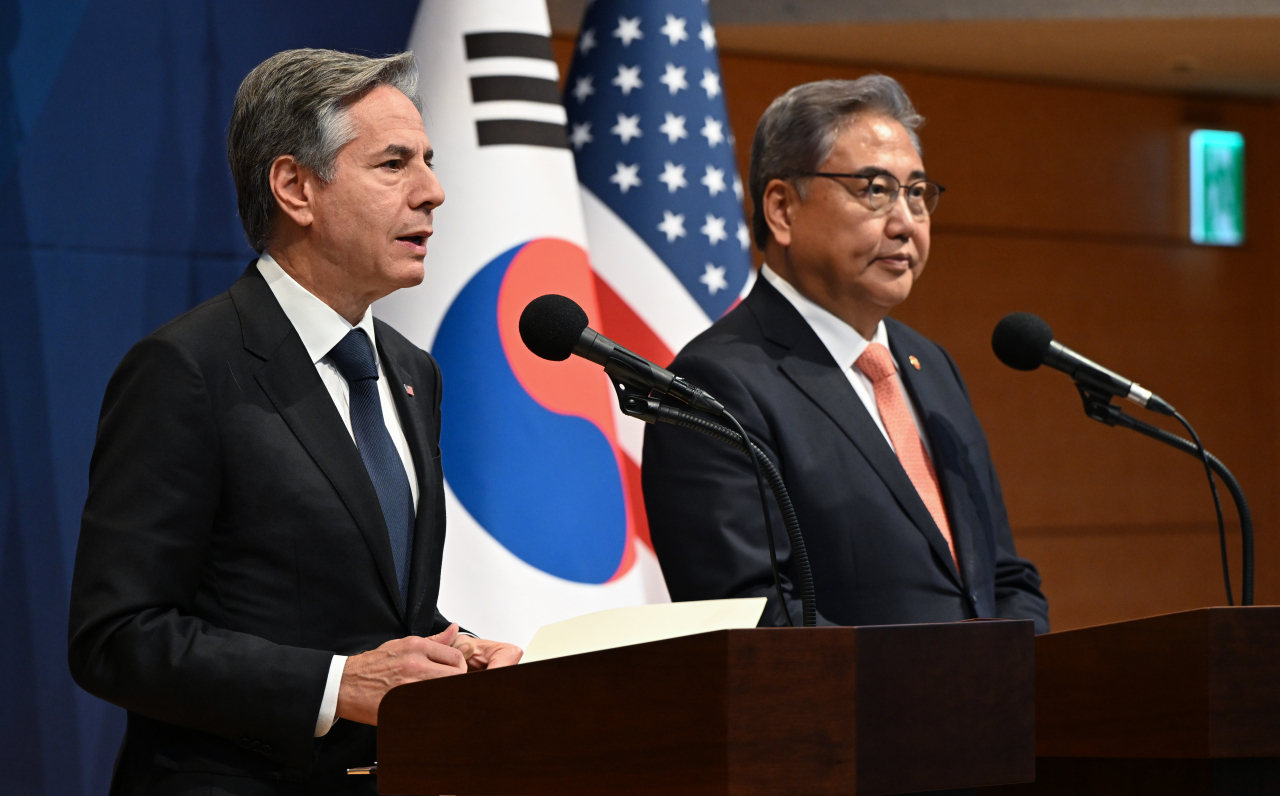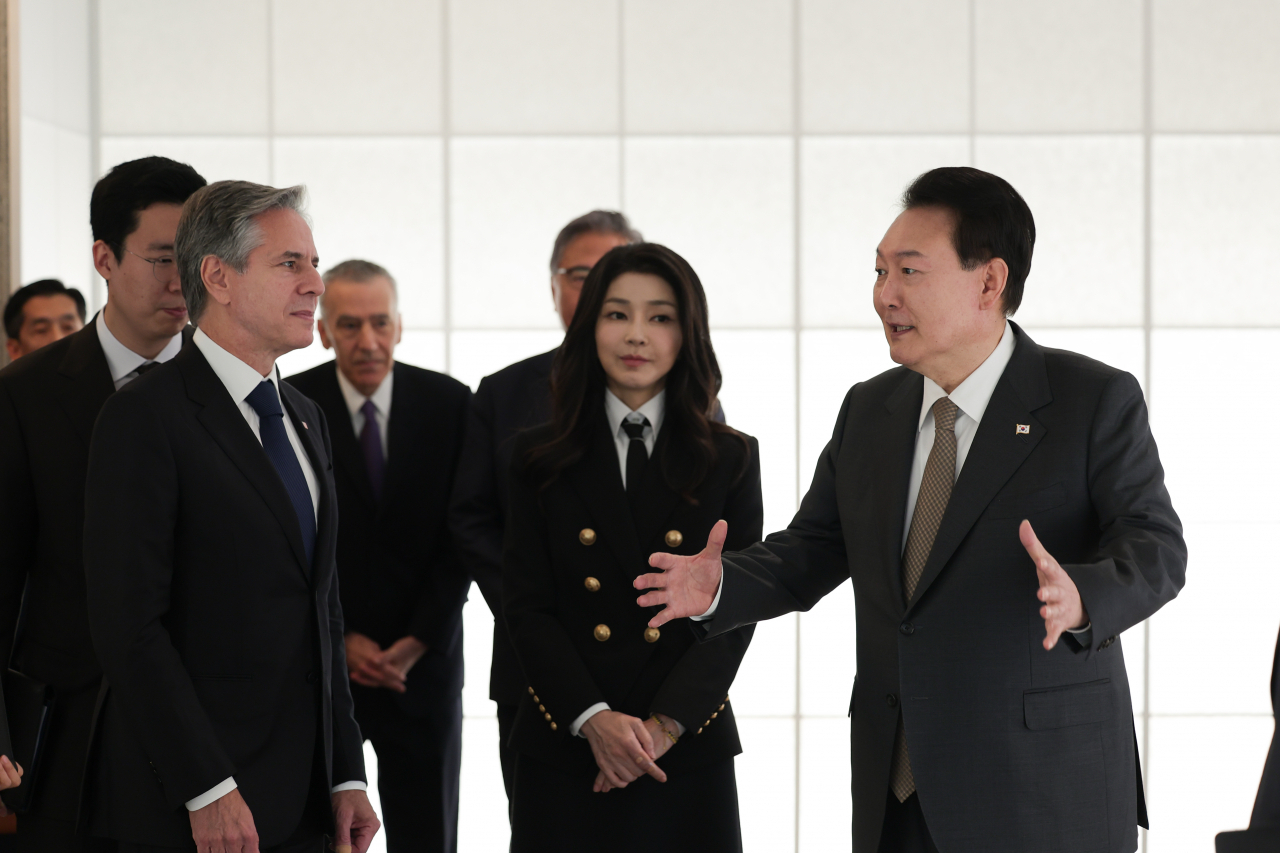 |
US Secretary of State Antony Blinken (left) and South Korea's Foreign Minister Park Jin hold a joint press conference after their meeting held in Seoul, Thursday. (Joint Press Corp.) |
US Secretary of State Antony Blinken condemned North Korea's provocative actions and its provision of military equipment and munitions to Russia for the invasion of Ukraine, in a joint news conference Thursday with South Korea's Foreign Minister Park Jin.
"We share profound concerns about the DPRK's growing and dangerous military cooperation with Russia," Blinken said, referring to North Korea by its official name, the Democratic People's Republic of Korea.
"Park and I spoke about further actions that our countries can take with partners to intensify pressure on Moscow not to transfer military technologies to the DPRK in violation of multiple (United Nations) Security Council resolutions."
Over alleged military cooperation between Pyongyang and Hamas, the Palestinian militant group, Park and Blinken did not elaborate when asked if there was proof of direct bilateral cooperation.
Park said, "(South Korea) is paying close attention to any potential cooperation between North Korea and Hamas in terms of weapons, strategies or tactics employed by Hamas."
They would consider heaping more sanctions on North Korea should any indication of cooperation be discovered, Park said.
"We are keeping close tabs on the situation in the Middle East because we see that the geopolitical crisis in the Middle East may pose security challenges on the Korean Peninsula," he said.
The conversation between Park and Blinken also touched upon the fate of the inter-Korean military pact signed in 2018 during the former Moon Jae-in administration. "Secretary of Defense (Lloyd) Austin will be in Korea this weekend and I hope we could pursue these conversations," Blinken said.
Park expressed hopes that China -- ahead of an anticipated meeting next week between US President Joe Biden and Chinese President Xi Jinping -- will play a mediating role in the military cooperation between Pyongyang and Moscow, on the grounds that the increasing geopolitical tension in East Asia due to Pyongyang-Moscow exchanges "undermines Beijing's national interest."
 |
South Korea's Foreign Minister Park Jin (right) and US Secretary of State Antony Blinken hold a joint press conference after their meeting held in Seoul, Thursday. (Joint Press Corp.) |
The remarks came during the US top diplomat's first visit to South Korea in nearly three years. Blinken's two-day visit beginning Wednesday is the first of its kind since President Yoon Suk Yeol took office.
Blinken's meeting with South Korean officials was also joined by US Deputy Chief of Staff Tom Sullivan, US Ambassador to South Korea Philip Goldberg, US Assistant Secretary of State for East Asian and Pacific Affairs Daniel Kritenbrink and spokesperson for the US Department of State Matthew Miller.
On Thursday, Blinken, who arrived in Seoul the night before, met Park, Yoon and Yoon's national security adviser, Cho Tae-yong.
Yoon said the US' leadership is of greater importance in the wake of the instabilities in the Middle East, in addition to North Korean nuclear threats and the war in Ukraine, according to the South Korean presidential office.
According to the US Department of State, Blinken earlier on Thursday discussed with Cho ways for South Korea and the US to respond to global challenges, including Russia’s invasion of Ukraine and Russia’s growing military cooperation with North Korea, as well as instability in the Middle East.
The message Blinken delivered was in line with that of Group of Seven ministers who underscored the need for a two-state solution for the coexistence of Israel and a viable Palestinian state.
Concerns are growing after the meeting of Russia's President Vladimir Putin and North Korean leader Kim Jong-un in Russia in September served to help both Pyongyang and Moscow achieve their respective military developments.
North Korea has been sending artillery shells and other military equipment, allegedly in exchange for Russia's technology to increase North Korea’s chances of launching a spy satellite -- which some watchers see as tools to advance Pyongyang's long-range ballistic missile capabilities that have the potential to reach Washington.
 |
President Yoon Suk Yeol (right) receives US Secretary of State Antony Blinken (left, front) at his office in Seoul, on Thursday. (Presidential Office) |
The North Korean regime was also accused of allowing Hamas to use North Korean weapons for its attack on Israel, which North Korea denied.
South Korea's National Intelligence Service earlier in November revealed during the country's parliamentary audit that North Korean leader Kim Jong-un had instructed “a wide range of support” for Palestine.
Against this backdrop, a Hamas official praised North Korea's Kim as “perhaps the only one in the world capable of striking the United States.”
"Iran does not have weapons that can reach America, but it can strike Israel and the American bases and ships in the region," said Ali Baraka, head of external relations of Hamas in an interview last week. "If the US clearly expands its intervention, North Korea, however, does have the capability to strike America. The day may come when North Korea intervenes, because it is, after all, part of (our) alliance."
Meanwhile, South Korea is on alert over the growing cybersecurity threats posed by North Korea. According to the NIS, more than 80 percent of foreign cyberattacks against South Korea were conducted by either North Korea or China.
Seoul is one of the destinations of Blinken's weeklong trip. Beginning Nov. 2, Blinken has visited Tel Aviv, Israel; Amman, Jordan; Ramallah, the de facto capital of the State of Palestine; Baghdad; Ankara, Turkiye and Tokyo. After departing Seoul on Thursday, Blinken's final destination will be New Delhi, before returning to Washington.





![[Exclusive] Hyundai Mobis eyes closer ties with BYD](http://res.heraldm.com/phpwas/restmb_idxmake.php?idx=644&simg=/content/image/2024/11/25/20241125050044_0.jpg)
![[Herald Review] 'Gangnam B-Side' combines social realism with masterful suspense, performance](http://res.heraldm.com/phpwas/restmb_idxmake.php?idx=644&simg=/content/image/2024/11/25/20241125050072_0.jpg)
